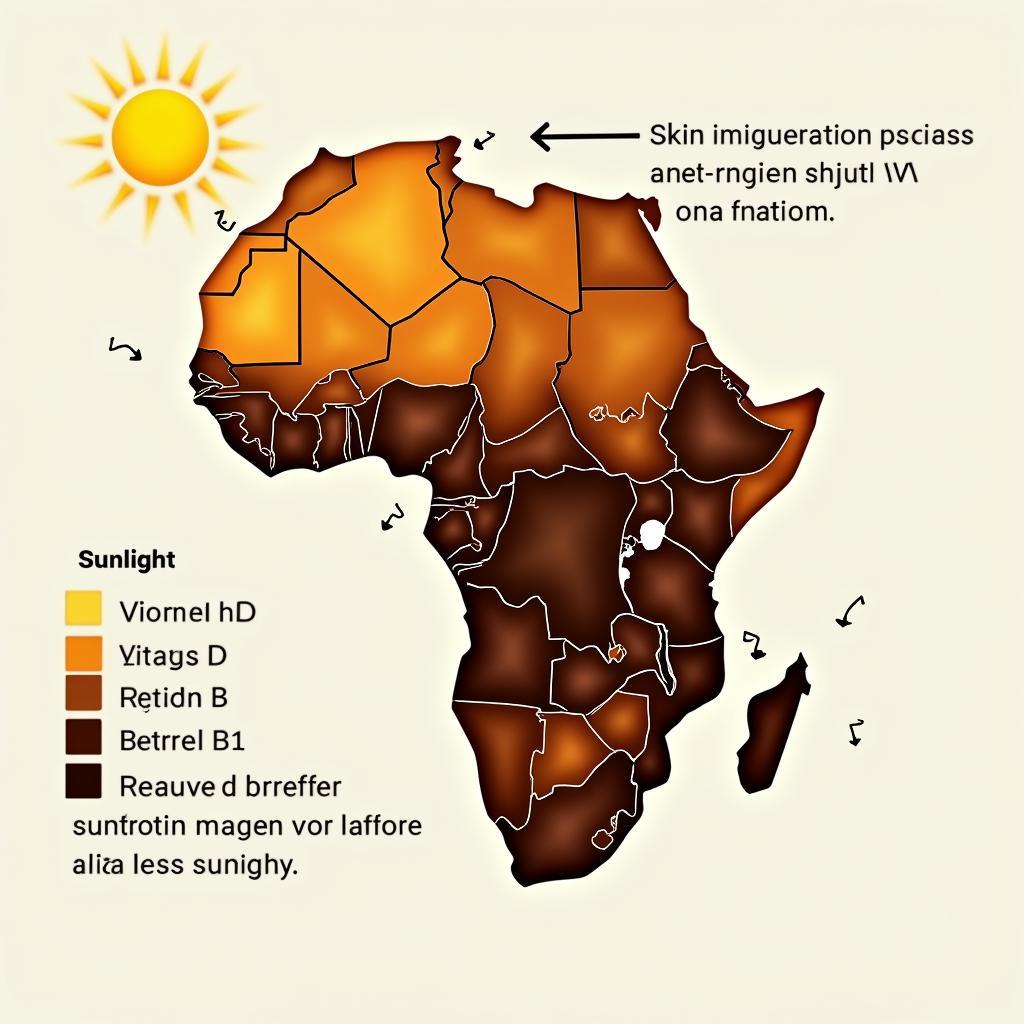Unraveling African Genetic Traits: A Journey Through Diversity
African Genetic Traits are a testament to the continent’s rich and complex history, reflecting millennia of human adaptation, migration, and evolution. Understanding these traits provides invaluable insights into not only the biological makeup of African populations but also the profound impact of environmental factors and cultural practices on shaping human diversity. This journey into African genetic diversity will explore the fascinating interplay between genes, environment, and culture.
The vastness of the African continent has fostered an incredible range of genetic diversity, often exceeding that found in other regions of the world. This genetic richness is a consequence of Africa being the cradle of humankind, where our species first emerged and began its long evolutionary journey. From the Khoisan people of Southern Africa, known for their unique click languages, to the nomadic pastoralists of East Africa, the genetic tapestry of Africa is as varied as its landscapes. These diverse populations harbor a wealth of genetic information, holding clues to our shared human ancestry and the intricate mechanisms of adaptation. Understanding these african ancestors human evolution is crucial to unraveling the complex story of human evolution.
The Influence of Environment on African Genetic Traits
Environmental pressures have played a significant role in shaping African genetic traits. For instance, the prevalence of sickle cell trait in certain regions of Africa is directly linked to the presence of malaria. While carrying the sickle cell gene can lead to health complications, it also confers resistance to malaria, demonstrating the powerful influence of natural selection in shaping genetic adaptations. Similarly, variations in skin pigmentation across the continent reflect adaptation to differing levels of UV radiation, showcasing the interplay between genetics and environmental factors.
 African Skin Pigmentation Adaptation to UV Radiation
African Skin Pigmentation Adaptation to UV Radiation
Cultural Practices and Genetic Diversity
Cultural practices, including dietary habits and marriage patterns, also contribute to the distribution of genetic traits across Africa. For example, lactose intolerance, common in many parts of the world, is less prevalent in certain African pastoralist communities where dairy consumption is a significant part of the diet. This adaptation reflects the influence of cultural practices on genetic selection.
Exploring Specific African Genetic Traits
Several specific genetic traits have been the focus of research, offering valuable insights into human history and adaptation. Studies on Africans with blue eyes provide a compelling example of how genetic variations can arise and spread within populations, challenging traditional assumptions about the genetic makeup of different racial groups. Even seemingly simple traits, like eye color, can reveal complex genetic histories and migrations.
What are some common misconceptions about African genetic traits?
One common misconception is the idea of a homogenous “African race.” In reality, African populations exhibit the highest levels of genetic diversity globally. Another misconception is that certain traits are exclusive to specific groups. Genetic variations often transcend geographic and ethnic boundaries.
How do African genetic traits contribute to our understanding of human evolution?
African genetic traits provide a window into our shared human ancestry. By studying these traits, we can trace migration patterns, understand adaptations to different environments, and gain insights into the complex processes that shaped human evolution. Studying African dog breeds az also provide insights into the complex relationship between humans and animals across the continent.
Conclusion
African genetic traits represent a remarkable tapestry of human diversity. By exploring these traits, we gain a deeper understanding of human adaptation, migration, and the complex interplay between genes, environment, and culture. Further research into African genetic traits promises even more profound insights into our shared human heritage and the intricate mechanisms that have shaped us as a species. Exploring resources like information on african countries with blue eyes further enriches our understanding of this fascinating field.
FAQ
- What is the significance of studying African genetic traits? Studying African genetic traits is crucial for understanding human origins and the evolution of our species.
- Why is Africa considered the cradle of humankind? Africa is considered the cradle of humankind because fossil evidence suggests that the earliest humans originated there.
- How does the environment influence genetic traits? Environmental pressures, such as disease and climate, can drive natural selection, leading to the prevalence of certain genetic traits.
- What role does culture play in shaping genetic diversity? Cultural practices, like dietary habits and marriage patterns, can influence the distribution of genetic traits within populations.
- Are there any misconceptions about African genetic traits? Yes, a common misconception is the notion of a homogenous “African race.” Africa boasts the greatest genetic diversity globally.
- How can I learn more about African genetic traits? Numerous resources, including scientific publications and educational websites, offer in-depth information on this topic.
- What are some examples of specific African genetic traits? Examples include sickle cell trait, variations in skin pigmentation, and lactose tolerance.
Common Scenarios and Questions:
-
Scenario: A researcher is interested in studying the genetic basis of disease resistance in certain African populations.
-
Question: What ethical considerations should be taken into account when conducting genetic research in African communities?
-
Scenario: A student is writing a paper on the impact of migration on African genetic diversity.
-
Question: What are some key historical migration events that have shaped the genetic landscape of Africa?
Further Exploration:
Consider exploring topics such as the genetics of language diversity in Africa, the role of genetics in understanding ancient African civilizations, and the ethical implications of genetic research. You might also find information about the african black strain interesting.
Need Assistance?
For any further assistance or inquiries, please do not hesitate to contact us:
Phone: +255768904061
Email: kaka.mag@gmail.com
Address: Mbarali DC Mawindi, Kangaga, Tanzania.
Our customer support team is available 24/7.


